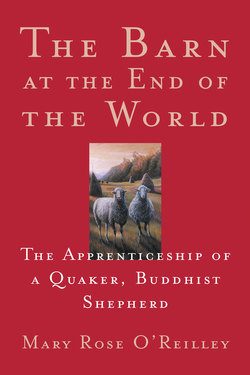Читать книгу The Barn at the End of the World - Mary Rose O'Reilley - Страница 26
На сайте Литреса книга снята с продажи.
ОглавлениеOrdinary Time
WHILE ROBIN AND I were in England, Ben got the results of the ram lamb’s postmortem, which showed hemophilus pneumonia, and, now that I am back, we are puzzling over what, if anything, to treat the others with.
The last two days I’ve been doing morning barn chores by myself. I love to be outside in the early light, the pasture covered in mist. This morning as I brought corn out to the ewe lambs behind the shed, two big sheep bashed me from behind and pushed me against the feeder, then stuck their heads into the metal interstices, pinning me by the leg. I had to lean on them and push with all my might. Then I climbed to freedom by crawling across a shelf of wooly backs. These animals try all kinds of things with me they wouldn’t try with Ben. It’s hard to boss the big lambs while carrying two buckets, seventeen pounds of corn each, and keeping noses out of it till I get across the pasture to the feeding station.
We have twelve skinny white-faced Polypay ewes in the barn setting up a racket, running their thin pale tongues out and bleating madly. They’re being weaned from their lambs. They get nothing but hay for forty-eight hours—no corn, no water. Tears rise to my eyes as I deal with these animals, caught in the ordinary suffering of life. Sentimental? Yes, but you see, my youngest daughter, Julian, is going away to college next week, and I feel all too keenly the plight of these bereft ewes. Ben and I call them “the church ladies.” With their fringe of white perms and incessant vocalization, they remind us of a certain stalwart type of Lutheran woman.
This morning when I came in, I was surprised to discover two Simmental heifers, a cow and her calf (the kind of French-looking beef stock painted by Rosa Bonheur) grazing behind the barn. And several handsome Suffolks as well as a beautiful Dorset ram, just washed. Today’s job was to “show shear” and wash these animals for a judging up north.
As I was feeding, a sudden violent storm came up, the barn lights went on, and rain crashed on the tin roof. The cows with their deep low seemed to be trying to pacify the ewes, still running skinny tongues out over their perfectly spaced and false-looking teeth in a panic of bleating. The wall of rain slid between us and the city; we had become the barn at the end of the world. All the animals, myself included, quieted down like a congregation hearing bells.
In the lambing barn, where at this season we usually park our cars, Ben had the beautiful Dorset ram lamb up on the fit stand, currying it. With their white poll, short ears, and stocky bodies, Dorsets look like the lambs Polish people mold out of butter: the kind depicted in church windows with a victory flag under the right front hoof, the kind of which D. H. Lawrence wrote, “I like lambs too much to have them stand for something.”
